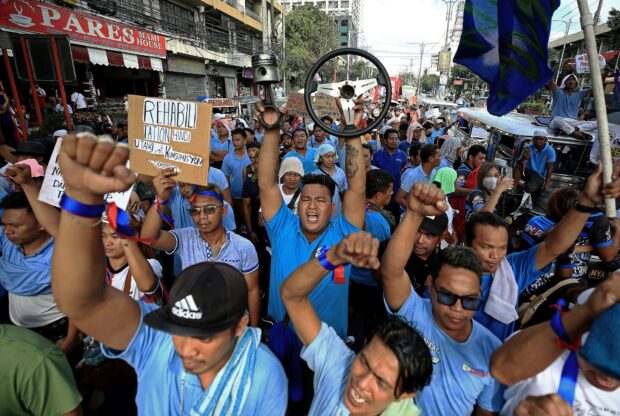Deadline extension of PUV consolidation not enough – Makabayan bloc

Public transport drivers and operators march in protest on Friday, Dec. 29. 2023, in Manila against the public utility vehicle modernization program. (File photo by RICHARD A. REYES / Philippine Daily Inquirer)
MANILA, Philippines — The three-month extension of the deadline for franchise consolidation of public utility vehicles (PUV) under the modernization program is not enough to address the plight of jeepney drivers and operators, Makabayan bloc House members said.
In separate statements on Wednesday, Gabriela party-list Rep. Arlene Brosas and Kabataan party-list Rep. Raoul Manuel called for the total removal of the required consolidation of franchises under a cooperative — especially since the hearings of the House Committee on Transportation revealed a lot of concerns from the transport sector.
Earlier, after transport sector groups met with House lawmakers led by Speaker Ferdinand Martin Romualdez, Malacañang announced that President Ferdinand Marcos Jr. had extended the consolidation deadline for three more months.
‘Highly illogical’
“The House committee hearing on the PUV modernization program has revealed numerous issues on its implementation, including corruption and lack of transparency,” Brosas said.
“It is highly illogical for the Marcos Jr. administration to just extend the deadline. All the issues point to only one solution: junk the mandatory franchise consolidation and the anti-poor modernization program to protect our jeepney drivers’ livelihood,” she added.
Meanwhile, Manuel said in Filipino: “Although poor drivers and operators can still make trips for three more months, Marcos should acknowledge that they still need their livelihoods after the extension.
“The poor drivers and operators do not want to surrender their franchise because the mandatory franchise consolidation is a scheme for corporations to control the franchises and public transport routes. That’s why in the end, if there is a deadline that should be imposed, it is on the government, regarding when they would fund jeepney rehabilitation, local vehicle manufacturing, and support for drivers and operators.”
Foreign interests
Brosas echoed Manuel’s statements, claiming that the PUV modernization program would only serve the interests of foreign companies as local firms could just as well make jeepneys that comply with modern standards.
“The program is being forced to secure the income that foreign and local businesses, while jeepney drivers and commuters would bear the burden of a transport crisis if the traditional jeepney phaseout continues,” Brosas said.
Earlier, several lawmakers — including Antipolo 2nd District Rep. Romeo Acop, who chairs the House Committee on Transportation — were disappointed with the alleged lack of preparedness and unawareness of the Land Transportation Franchising and Regulatory Board (LTFRB) about the PUV modernization program.
Acop said that the program was a good one but was being implemented by an agency in disarray.
Other lawmakers also expressed doubts about whether the Department of Transportation (DOTr) could fulfill its assurance that there would be no public transport shortage once the consolidation requirement takes effect, noting provinces had few transport alternatives.
Abang Lingkod party-list Rep. Joseph Stephen Paduano said transportation alternatives might exist in Metro Manila — with its train systems, buses, taxis, and transport network vehicle services in place. But for provinces in other regions, like Western Visayas, this might not be the case.































